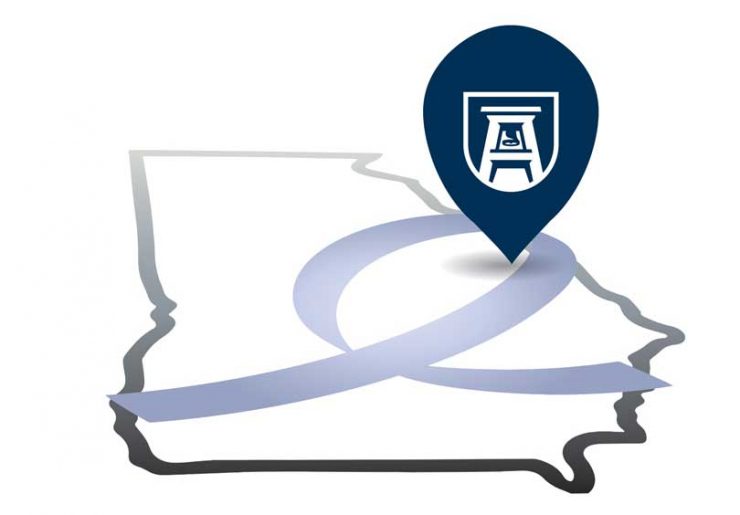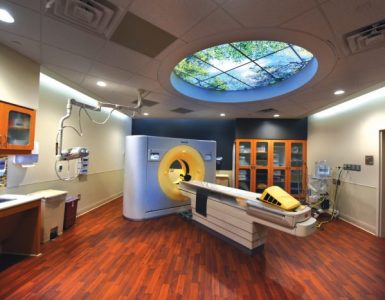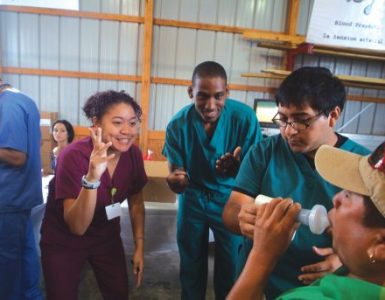How does research at the Georgia Cancer Center benefit patients in Georgia and beyond?
Not only do they treat patients with current standard of treatment options for cancer patients, Dr. Anand Jillella, J. Harold Harrison, MD, Distinguished University Chair in Medical Oncology and Dr. Sharad Ghamande, director of Gynecologic Oncology and the associate director for Clinical Trials and Research for the Georgia Cancer Center at Augusta University, have also done a lot of work in clinical research studies looking for what will be tomorrow’s standard of care. Jillella’s area of focus is acute promyelocytic leukemia (APL) and Ghamande’s expertise is in gynecological cancers, especially recurrent ovarian and cervical cancer.
GHAMANDE: Clinical research is a very important part of what we do at the Georgia Cancer Center. It is one of the three pillars of our mission, the other two being basic science research and clinical care. One of the big research projects we have going on right now is the National Cancer Institute Community Oncology Research Program (NCORP). We are one of 12 sites in the United States awarded this five-year grant focusing on getting minority and underserved patients to enroll in cutting-edge clinical trials.
JILLELLA: When I came back to the Georgia Cancer Center, one of my goals was to build a stronger network with hospitals, doctor’s offices and clinics across the state. We want those institutions to know they can send their patients to see our doctors and take part in their clinical trials. I truly believe we have one of the most well established networks in the state. We made it our business to go to Albany, Macon, Savannah and other communities to meet the staff, the nurses and the doctors. They need to know there is another option available here at the Georgia Cancer Center when their patients want to know if there is something that could save their lives after the current “standard of treatment” options for their type of cancer fail.
GHAMANDE: Through the NCORP grant, we have partnered with five different hospitals and institutions in Georgia to recruit patients for new cancer drug trials as well as health care delivery research. They include Morehouse School of Medicine, DeKalb Medical, the University Cancer & Blood Center in Athens, the Jiann-Ping Hsu College of Public Health, and Phoebe Putney Memorial Hospital in Albany. We are also working with Augusta Oncology to make them our sixth partner. The percentage of total patients taking part in clinical trials in the United States is less than 5 percent. Of those patients, less than 5 percent are minorities. The enrollment for this NCORP trial is growing each year, and I’m very proud to say this year our minority accrual is a whopping 45 percent.
JILLELLA: Between 2005 and 2009, we treated 19 cases of APL, and the mortality rate was 39 percent. After a trip to a research seminar, a colleague challenged me to bring that rate down. I started reviewing the charts and findings from those patients who lived and comparing them to the charts from those who lost their lives. In the spirit of partnership, I asked a doctor at Johns Hopkins for his thoughts. Working together, we determined that there were three factors that could play a role in death, including blood loss, death from complications associated with the medications they were taking, or dying from an infection not associated with their APL. We developed a two-page checklist that we shared with doctors in Georgia to help them give their patients the best chance at survival. I’m happy to say that after seeing 23 patients, we had zero deaths. We worked with the Leukemia & Lymphoma Society to bring in other doctors in the region. The early data was so compelling, the National Cancer Institute let me expand the research project to the entire country. As of September 2017, the team of seven APL experts had handled 163 patient cases, and we brought the mortality rate down from 39 to 6.7 percent.
GHAMANDE: Apart from our cooperative group trial through the NCORP grant, we have several promising clinical trials, including phase 1 trials (first in human) and immunotherapy trials targeting specific cancers. We are now getting patients from across the state and even the country for some of these trials. For women with gynecologic cancers, we are becoming one of the powerhouses in the southeastern United States. For one phase 1 cervical cancer vaccine study, we have accrued patients from California, Alabama, Texas and even Canada.
JILLELLA: We are a research center and a resource center to medical centers across the state. So far, we have had one team take their basic science research and turn it into a first-in-human clinical trial. That team of Dr. David Munn, Dr. Andrew Mellor and Dr. Ted Johnson has gained international attention. Early data provides hope for a breakthrough treatment option for devastating brain cancers. Now, we want to find the next story like that. If those trials don’t currently exist, then we need to create them. We want to challenge our talented teams of researchers to find the gaps in treatment and start the process necessary to fill those holes.
GHAMANDE: In fact, we have a new clinical trial that launched around the end of 2016 that came from the lab of Dr. Esteban Celis. It uses polyinosinic: polycytidylic acid, also known as poly I:C, in combination with a checkpoint inhibitor to offer cancer patients a novel, promising immunotherapeutic treatment combination in a phase 1 study that has effectively eradicated tumors in mice. This will be a great example of bench-to-bedside research, which is phenomenal.
JILLELLA: Doing bench-to-bedside research and developing new clinical trials will benefit the patients within driving distance of the Georgia Cancer Center, patients living in other states and other countries.
GHAMANDE: While finding new therapies and new treatments for the various forms of cancer drives our research efforts, the core mission is finding ways to prevent cancer in the first place. The Cancer Community Awareness & Access Research Education (c-CARE) initiative is one of our programs that has done an outstanding job with that mission. We started the program by focusing on lung cancer because our rates of lung cancer are very high. And the mortality rates are disproportionately high with higher stages of cancer in African Americans, as opposed to Caucasians. Workers with the c-CARE program train leaders in churches, and train community leaders and others who can then use their training to educate people about the risks and prevention of lung cancer. Dr. Martha Tingen’s tobacco cessation program is a big part of this effort.
JILLELLA: While working with those community leaders is important, it is also critical to reach out to hospitals across our catchment area. When you have a network, you end up being a resource. We are a research center, and the teams working in our labs are developing treatments that could be offered to patients across Georgia. We already have clinics calling for assistance after they tried every standard treatment for their patients. Those patients will ask their doctors about next steps, and those doctors will reach out to us to see what clinical research we have going on that could be that next step.
Biographies
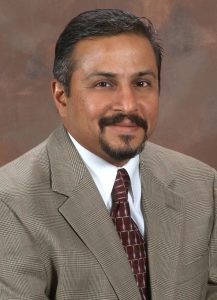
Dr. Sharad Ghamande is chief of the Section of Gynecologic Oncology at the Medical College of Georgia. He is also the associate director for clinical research at the Georgia Cancer Center at Augusta University.
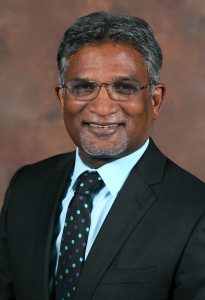
Dr. Anand Jillella is the J. Harold Harrison, MD, Distinguished University Chair in Medical Oncology at the Medical College of Georgia. He is also the associate director of Medical Oncology Services at the Georgia Cancer Center.

